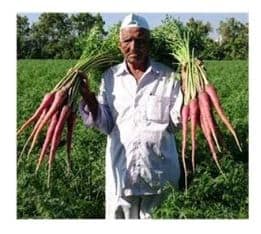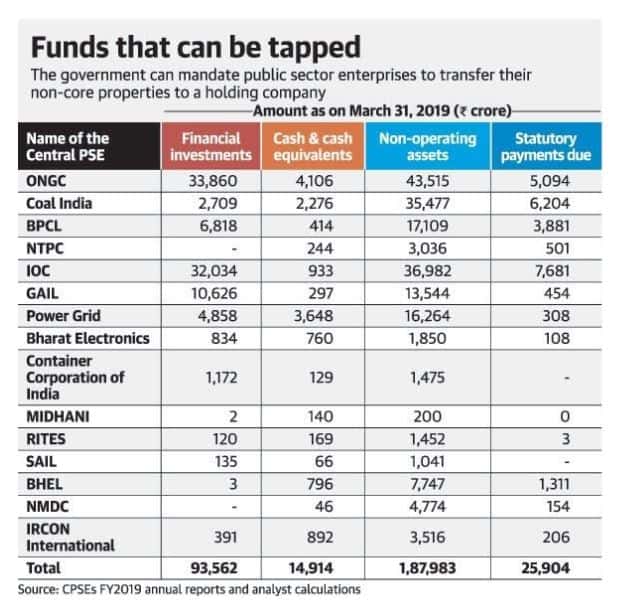IASbaba's Daily Current Affairs Analysis
IAS UPSC Prelims and Mains Exam – 9th April 2020
Archives
(PRELIMS + MAINS FOCUS)
Food Corporation of India directed to provide grains to NGOs
Part of: GS Prelims and GS – II – Role of NGOs; GS-III – Marketing of agricultural produce
In News:
- The Government has directed Food Corporation of India to provide wheat and rice to NGOs.
- The food grains will be provided at the Open Market Sale Scheme (OMSS) rates without going through the e-auction process.
Key takeaways:
- FCI has network of more than 2000 godowns in the country.
- Large network of godowns will ensure smooth supply of food grains to these organisations in this hour of crisis posed by COVID-19.
- It will help relief camps in their philanthropic work of feeding poor and migrant workers.
Important value additions:
The Food Corporation of India (FCI)
- It was setup under the Food Corporation’s Act 1964.
- The objectives are:
-
- Effective price support operations to safeguard the interests of the farmers.
- Distributing foodgrains throughout the country for Public Distribution system.
- Maintaining satisfactory level of buffer stocks to ensure National Food Security.
- Since its inception, FCI has played a significant role in maintaining food security in the country.
Open Market Sale Scheme (OMSS)
- It refers to selling of foodgrains by Government/Government agencies at predetermined (decided in advance) prices in the open market from time to time.
States asked to invoke Essential Commodities Act, 1955
Part of: GS Prelims and GS-II – Polity & Governance
In News:
- States are asked to invoke Essential Commodities (EC) Act, 1955 by the Ministry of Home Affairs to maintaining smooth supply of essential items at fair prices in the country.
- The measures include fixing of stock limits, capping of prices, enhancing production, etc.
Key takeaways:
- States can now notify orders under the EC Act, 1955 without prior agreement from the Central Government up to June 30, 2020.
- Offences under EC Act are criminal offences and may result in imprisonment of 7 years or fine or both.
- Offenders can also be booked under the Prevention of Black-marketing and Maintenance of Supplies of Essential Commodities Act, 1980.
Important value additions:
Essential Commodities (EC) Act, 1955
- It is an act of Parliament of India.
- It was established to prevent hoarding of the essential commodities and to ensure their timely delivery so that the normal life does not get affected.
- This includes foodstuff, drugs, fuel (petroleum products) etc.
Funding for developing nasal passage gel approved
Part of: GS Prelims and GS-II – Health; GS – III – Science and Technology
In News:
- Department of Science and Technology (DST) has approved funding for Department of Biosciences and Bioengineering, IIT Bombay.
- The team from the department shall develop a gel that can be applied to nasal passage.
- It will capture and inactivate novel corona virus, the causative agent of COVID-19.
- This solution will ensure the safety of health workers.
- It can lead to reduction in community transmission of COVID-19.
Biofortified carrot variety benefits local farmers
Part of: GS Prelims and GS – III – Science and Technology
In News:
- Madhuban Gajar, a biofortified carrot variety, developed by a farmer scientist has benefited hundreds of farmers in Gujarat.
- The carrot has high β-carotene (beta-carotene) and iron content.
Key takeaways:
- The variety is being cultivated in Gujarat, Maharashtra, Rajasthan, West Bengal, Uttar Pradesh since the last three years.
- The Madhuvan Gajar is used for various value-added products.
- It was developed by Shri Vallabhhai Vasrambhai Marvaniyawas.
- He has received a National Award (2017) and a Padma Shri (2019) for his extraordinary work.
Important value additions:
Biofortification
- It means breeding crops to increase their nutritional value.
- This can be done either through conventional selective breeding, or through genetic engineering.

Image source: http://nif.org.in/Innovationofday/madhuvan-gajar-a-high-nutritious-carrot-vareity/6
(MAINS FOCUS)
POLITY/WELFARE
Topic: General Studies 2:
- Separation of powers between various organs
- Good Governance
- Welfare/Developmental issues
MPLADS: Members of Parliament Local Area Development Scheme
Context: The Union Cabinet approved a 30% cut in the salaries of all Members of Parliament and a two-year suspension of MPLAD scheme so that the amount saved can go to the Consolidated Fund of India (CFI) to fight COVID-19.
What is MPLADS Scheme or Sansad Nidhi Yojana?
- It is a central sector scheme for MPs to recommend works of developmental nature in their constituencies
- It was launched in December, 1993
- The emphasis is on creating durable community assets based on locally felt needs.
- Parent Body: Ministry of Statistics and Programme Implementation (MOSPI)
- The funds – Rs. 5 crore/annum/MP – under the scheme are non-lapsable.
- Funds are released in the form of grants in-aid directly to the district authorities.
- MPs have only recommendatory role and the district authority is empowered to examine the eligibility of works, select the implementing agencies and monitor it.
Criticism of the scheme
- Against the separation of powers: It allows individual legislators to encroach on executive role of planning & implementation works
- Promotes Patronage Politics: MPLADS gives scope for MPs to utilise the funds as a source of patronage that they can dispense at will.
- Inefficiency: Gap between recommendation made by MPs and implementation by the district administration
- Unused Funds: Some members do not utilise their full entitlement
- Weak monitoring of the scheme has led to allegations of misuse & corruption
Views about the scheme
- Judiciary: The Supreme Court has upheld the scheme but called for a robust accountability regime
- Second ARC: It recommended its abrogation altogether, highlighting the problems of the legislator stepping into the shoes of the executive
Why MPLADS was suspended for two years?
- It frees up financial resources of about ₹7,900 crore
- It will boost the funding available for the COVID-19 fight
- The funds can be spent on boosting the health infrastructure needed to combat the pandemic.
- Judicious usage of Funds: Money will now go into CFI and will be spent based on an assessment of the varying needs in different regions of India.
Challenges ahead due the suspension of scheme
- Political discontent: Funding under the scheme was source of much goodwill for elected representatives.
- Centralising tendency: The step undermines the decentralised manner of funding local area development
- There are dangers that allocations of freed up funds can be discriminatory.
Connecting the dots:
- Parliamentary System – Merits and Challenges
- Other instances where there is breach of Separation of Power
ECONOMY
Topic: General Studies 3:
- Indian Economy and issues relating to planning, mobilization, of resources, growth, development and employment.
Financing the Pandemic rescue package
When COVID-19 cases began to increase, the Government of India (GoI) announced a 21-day national lockdown and a ₹1.7-lakh crore rescue package.
Challenges
- There are expectations of further such packages (aimed at businesses & middle class) and the challenges of financing these relief measures.
- Also, the financing strategy should be to raise long-term funds at cost effective rates, with flexible repayment terms.
How can government fund its relief packages?
- Utilizing the availability of unused resources in the state disaster relief fund to the tune of ₹60,000 crore
- Issuing of GDP-linked bonds
- Indian rupee denominated 25-year GDP-linked bonds that are callable from, say, the fifth year
- The interest on a GDP-linked bond is correlated to the GDP growth rate and is subject to a cap
- The issuer, the GoI, is liable to pay a lower coupon during years of slower growth and vice-versa.
- Precedence: Costa Rica, Bulgaria and Bosnia-Herzegovina issued such GDP-linked bonds in the 1990s, from whose experience India could learn
- Prerequisite: Publishing reliable and timely GDP data
- Utilizing the resources of Public Sector Enterprises(PSEs)
-
- Paying dues to GoI: The 15 largest non-financial central PSEs (CPSEs) owe the government ₹25,904 crore as of end-March 2019
- Using cash and bank deposits of these 15 CPSEs (₹64,253 crore) that is in excess of their operating requirements, to increase dividend to government
- Monetization of non-core assets of these CPSEs as they generally yield 200 basis points lower than the returns on their core businesses.
- Forming Public sector bank holding company (‘Holdco’) along the lines of Singapore’s Temasek Holdings to enable PSEs to monetise their non-core assets at remunerative prices
- Securitization of ₹30,168 crore loans that CPSEs have extended to employees, vendors and associates – to ensure that associated businesses remain liquid

Pic Source: The Hindu
Should government also tap the RBI resources?
- RBI has allocated ₹1 lakh crore to carry out long-term repo operations and has reduced the repo rates by 75 basis points to 4.4% to help banks augment their liquidity in the wake of pandemic
- Government already enjoys handsome dividends pay-outs by RBI
- During the five years ending on June 30, 2019, the RBI paid the GoI 100% of its net disposable income
- In FY2019 dividends from RBI more than trebled to ₹1.76 lakh crore from ₹50,000 crore in FY2018.
- The Bimal Jalan panel constituted in 2019 to review the RBI’s economic capital framework opined that:
- The RBI may pay interim dividends only under exceptional circumstances
- The unrealised gains in the valuation of RBI’s assets ought to be used as risk buffers against market risks and may not be paid as dividends
- Therefore, it is in India’s self-interest to allow a robust and independent RBI to defend the financial sector’s stability
Conclusion
The GoI may finance the COVID-19 rescue package by issuing GDP-linked bonds, tapping PSEs’ excess liquidity and monetising non-core assets
Connecting the dots:
- Different types of Investment Models
- Impact on the disinvestment plans of GoI
(TEST YOUR KNOWLEDGE)
Model questions: (You can now post your answers in comment section)
Note:
- Correct answers of today’s questions will be provided in next day’s DNA section. Kindly refer to it and update your answers.
- Comments Up-voted by IASbaba are also the “correct answers”.
Q.1 Consider the following statements:
- Essential Commodities (EC) Act was established to prevent hoarding of the essential commodities.
- Recently the states are being asked by the Government of India to invoke EC Act amidst COVID-19 pandemic.
Which of the above is/are correct?
- 1 only
- 2 only
- Both 1 and 2
- Neither 1 nor 2
Q.2 Consider the following statements regarding Food Corporation of India:
- It will provide major food grains to NGOs at the Open Market Sale Scheme (OMSS) rates.
- It plays major role in ensuring food security in India.
Which of the above is/are correct?
- 1 only
- 2 only
- Both 1 and 2
- Neither 1 nor 2
Q.3 The nasal passage gel is being developed by which of the following?
- IIT Bombay
- Department of Science and Technology
- Indian Council of Medical Research
- Ministry of Health and welfare
Q.4 Consider the following statements:
- Madhuban gajar is a biofortified tomato variety.
- It is high in beta-carotene.
Which of the above is/are correct?
- 1 only
- 2 only
- Both 1 and 2
- Neither 1 nor 2
ANSWERS FOR 8th April 2020 TEST YOUR KNOWLEDGE (TYK)
| 1 | C |
| 2 | A |
| 3 | A |
| 4 | B |
Must Read
About impact of lockdown on domestic violence:
About COVID-19 lockdown and religious congregations:
About need for decentralization of powers to fight COVID-19:
















